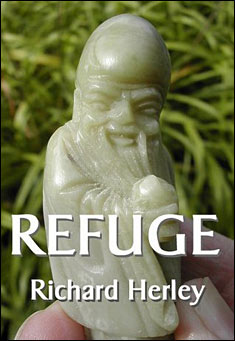John Suter believes himself to be the only survivor, twelve years after a global plague. Settling into a steady and self-sufficient daily life, he has gradually come to terms with his destiny. He discovers a mutilated body in the river near his house one morning. Alarmed and fearful, Suter knows he has little choice but to investigate the crime. Discovering something upstream, his endurance is tested to its limits and he is compelled to rethink not only his own humanity, but also his place within the human race he had once considered to be wiped out.
Excerpt:
Suter halted, his heart pounding, and crammed his binoculars to his eyes. What he had just glimpsed now lay before him in fearfully magnified view, snagged in the branches of a fallen willow some way downstream.
A man's body. Putrefying.
His terror was complete. It was a measure of his character that he could make himself stand there for as long as he did, adjusting the focus, examining and exploring the image.
At last, unable to bear any longer the torment of looking, he got behind the bole of the riverside copper beech and tried to think.
Where had it come from? How long had it been in the water? "No," he insisted. "You're seeing things. When you're ready
to come out in the open, it just won't be there. All right?" "All right."
"I thought all that was over with." "Over with."
"Over and done."
His breathing had become more regular now. He touched the stock of his shotgun, hanging against his thigh.
"You're OK."
"I am?"
"You are."
The beech tree was a personal friend. He loved and revered it,
knew it in all its seasons. The grey bark lent it the gentle, benign air of an elephant. With one hand flat against it, Suter peeped out, along the riverbank.
He had imagined nothing. The body was still there. "God help me."
Suter did not much care for God. He had said this as part of the continuous dialogue his two selves maintained aloud, a perennial, dreamlike commentary on the progress of his life.
"You've got to," he told himself, as he turned and started back, towards his house. "That's all there is to it. I'm having no arguments. Get that ... what d'you call it? Gripper. Grapple.
Whatever the hell it's called."
The grapnel made its arc over the river, hit and bounced off the willow branches, fell uselessly into the water. He retrieved it and tried again.
After several attempts, one of the hooks caught in the man's jacket. Leather, it looked like.
Suter hauled. The body came free of the willow, floated clockwise, and into the current, which instantly began contesting the prize.
He was still face-down, a tall and well-built fellow, a heavy burden for one in Suter's frame of mind.
Suter thought of letting go. If he did that, the man might drift fully away, as far down as Uxbridge, even, or into the Thames at Staines. Suter imagined him passing later that day through London, unhindered, unobserved, under the bridges, out to Essex,
to Shoeburyness, say, and on into the October stillness of the North Sea. Then Suter could forget about him, pretend he had never been.
But he did not let go; and when the body grounded, its upper half in the bed of decaying flags which fringed this side of the river, he took out his knife and got down the bank. For the first time in over twelve years, he was about to come face to face with another human being.
The smell was abominable.
With his boot, he turned the body over. He made himself look.
The facial tissue was putrid, monstrously bloated and discoloured. The beard had continued to grow somewhat - assuming that the man had been clean shaven at the time of death. His eyes had been removed, perhaps by crayfish. Or by the person or persons who had, with some big-bladed weapon, cut his throat so savagely as almost to sever the neck.
Suter looked down at the knife he himself was holding and could not remember unsheathing it. He put it back where it belonged.
His gaze returned to the body.
Where this had come from, there would be another. "Admit it."
"I won't." "You must."
The victim had been quite young, in his twenties or early thirties. His blond hair had remained uncut for some years, and was plaited in a sort of pigtail. Suter eyed the leather jacket, the dark corduroy trousers, the bare, uncalloused feet. There were distinct abrasions on the right ankle.









